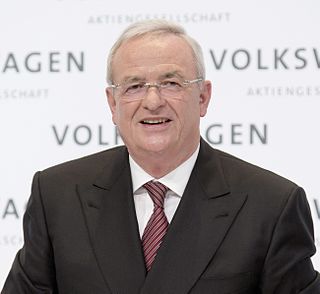A Quote by Martin Winterkorn
The European auto industry made a commitment to reduce carbon dioxide emissions by an average of 140 grams per kilometer. But then there was a significant change in what customers wanted in their vehicles.
Related Quotes
In the European Union, a fleet average of 95 grams of CO2 per kilometer will be permitted in 2020. This corresponds to fuel consumption of about four liters (per 100 kilometers; about 59 mpg). We have to continue reducing the fuel consumption of our vehicles and offer hybrid and electric vehicles, or else we will be unable to achieve these values.
Statistics compiled by the German Federal Motor Transport Authority highlight how successfully we have reduced fuel consumption. A few years ago, the CO2 emissions for the BMW brand were at well over 200 grams per kilometer. In 2009, that number was at 159 grams. This puts us below our direct competitors.


































